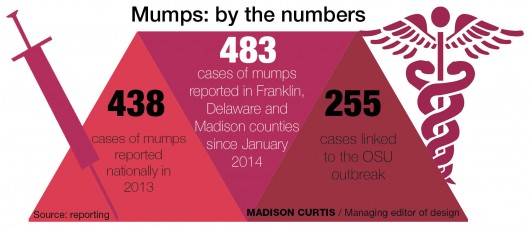The mumps outbreak might finally be starting to clear up.
Over the summer, the number of weekly reported cases of the mumps in Central Ohio decreased, Columbus Public Health spokesman Jose Rodriguez said.
“We hope that we are toward the end of the outbreak now,” he said Thursday. “The trend is definitely on our side and it’s definitely trending down.”
As of Wednesday, 483 cases had been reported in Franklin, Madison and Delaware counties since the first case was reported in January, according to a release from Columbus Public Health. Of those cases, 255 are linked to the Ohio State outbreak, the first of which was reported Feb. 10.
The Central Ohio outbreak is the largest since 1979, when 930 cases were reported for the year. This year’s outbreak exceeds the total number of cases reported nationally last year.
Mumps is a viral disease that infects the salivary glands, causing them to swell. It also can cause fevers, headaches, muscle aches and a loss of appetite, according to the Centers for Disease Control and Prevention’s website.
One student, however, said he’s not worried about catching the mumps.
“It was a concern of mine, but not anymore,” said Josef Koberlein, a first-year in biology. “It seems to be less publicized, but I guess that doesn’t mean it’s less likely to be contractible.”
Rodriguez said it’s hard to predict if the number of reported mumps cases might rise again considering some students are now living in close quarters again on campus.
Still, Rodriquez said OSU has done a good job of issuing vaccines to the university community.
OSU launched the Measles, Mumps and Rubella Vaccination Initiative in April to encourage students, faculty and staff to get vaccines against the disease. Receiving two doses of the MMR vaccine is 88 percent effective at preventing mumps, according to the CDC.
Some who were on campus at the start of the outbreak said they don’t see mumps as much of a threat anymore.
“It doesn’t really bother me,” said David Kilroy, a second-year in city and mechanical engineering. “I know it was a thing, but I’m not really worried about it anymore.”



